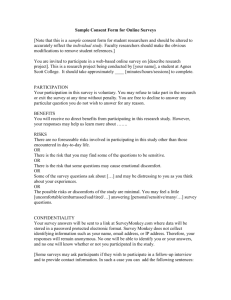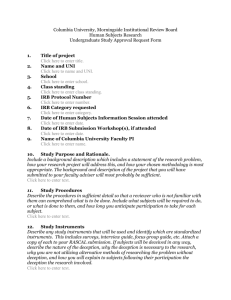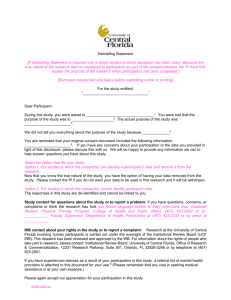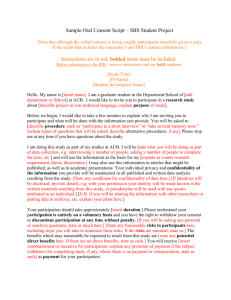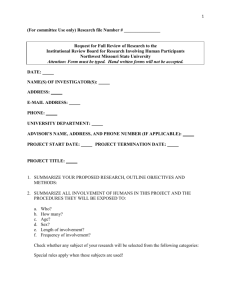Revisedconsentguidancetemplate
advertisement
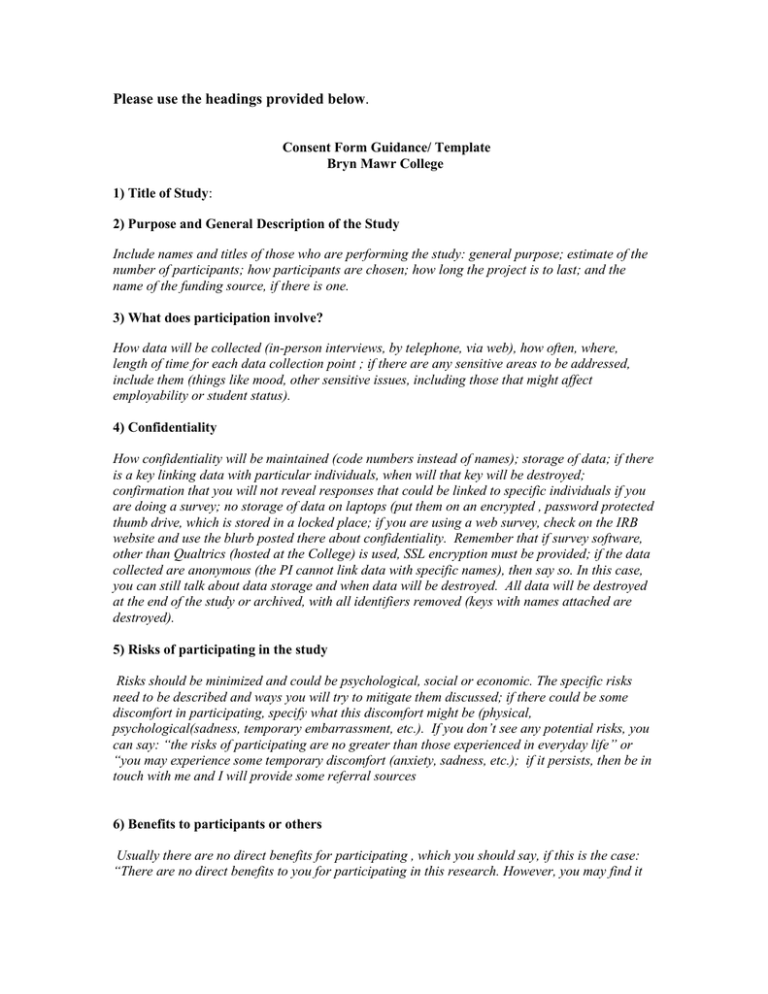
Please use the headings provided below. Consent Form Guidance/ Template Bryn Mawr College 1) Title of Study: 2) Purpose and General Description of the Study Include names and titles of those who are performing the study: general purpose; estimate of the number of participants; how participants are chosen; how long the project is to last; and the name of the funding source, if there is one. 3) What does participation involve? How data will be collected (in-person interviews, by telephone, via web), how often, where, length of time for each data collection point ; if there are any sensitive areas to be addressed, include them (things like mood, other sensitive issues, including those that might affect employability or student status). 4) Confidentiality How confidentiality will be maintained (code numbers instead of names); storage of data; if there is a key linking data with particular individuals, when will that key will be destroyed; confirmation that you will not reveal responses that could be linked to specific individuals if you are doing a survey; no storage of data on laptops (put them on an encrypted , password protected thumb drive, which is stored in a locked place; if you are using a web survey, check on the IRB website and use the blurb posted there about confidentiality. Remember that if survey software, other than Qualtrics (hosted at the College) is used, SSL encryption must be provided; if the data collected are anonymous (the PI cannot link data with specific names), then say so. In this case, you can still talk about data storage and when data will be destroyed. All data will be destroyed at the end of the study or archived, with all identifiers removed (keys with names attached are destroyed). 5) Risks of participating in the study Risks should be minimized and could be psychological, social or economic. The specific risks need to be described and ways you will try to mitigate them discussed; if there could be some discomfort in participating, specify what this discomfort might be (physical, psychological(sadness, temporary embarrassment, etc.). If you don’t see any potential risks, you can say: “the risks of participating are no greater than those experienced in everyday life” or “you may experience some temporary discomfort (anxiety, sadness, etc.); if it persists, then be in touch with me and I will provide some referral sources 6) Benefits to participants or others Usually there are no direct benefits for participating , which you should say, if this is the case: “There are no direct benefits to you for participating in this research. However, you may find it interesting to talk about the issues addressed in the research and it may be beneficial to the field and to future clients or individuals who have experienced similar concerns.” 7) Compensation (includes monetary payment or in-kind types of payment such as a gift card). If there is no compensation, then say so. The will be no compensation for participating in this research. 8) Deception If there is no deception, say “there is no deception used in this study”. If there is deception by omission (passive/misleading rather than actively deceiving the subject about the research, the researcher should use the following language: “The full purpose of the study will be revealed to you at the end of this study. We do not expect that there will be any detrimental effects”. 9) Voluntary participation This means that all potential respondents are free to choose whether to participate in the study or not; not to answer any questions they do not wish to answer; and withdraw their participation at any time without penalty. If you are dealing with employees (teachers, other staff), indicate that they are also free to participate or not and that nothing will be revealed about their participation to anyone at the agency/school, etc. You should say “Your participation is completely voluntary. You can withdraw from the study at any time. You do not have to answer any questions that you don't want to answer. If you choose not to participate, there will be no penalty or loss of any benefits for not participating”. If the subjects are clients/patients, you can say“it will in no way effect services you would normally receive”. If the participants are students, then say “it will in no way effect your grade in the class”. 10) Questions about the research and rights of research participants Here you need to address who to contact if there are questions about the research (the principal investigator and his/her supervisor of the research, if a student); if there are questions about the respondent’s rights as a research participant, the chair of the IRB’s name should be included/.As long as you are a student, faculty, or staff member at the College, the BMC IRB will review your research. Below is the script to use: “If you should have any questions about the research, please feel free to call or email the Principal Investigator, Mary Jones, (Put you own name in here, with contact information, and also the name of the person who will be supervising you, with his/her respective contact information). If you have questions about your rights as a research participant, please be in touch with Leslie Alexander, Professor and Chair, Bryn Mawr College IRB (lalexand@brynmawr.edu; 610-5202635) I am 18 or older: Yes _____ No______ I have read this consent form or it has been read to me: Yes______ No_____ I have had all of my questions about the study answered to my satisfaction. Yes___ No I have been given a copy of this consent form. Yes______ No________ I agree to participate in this research. Yes______ No_______ Also include any of the following questions that apply to this particular research. Most of these points will not apply to research performed by undergraduates. I give permission to audio/video (specify which one) tape my interview. Yes__ No___ I give permission for my photograph to be used in this research. Yes _____ No______ I give permission for you to attach my name to my responses if they are quoted or summarized in any papers, reports or articles produced from this study. (If you check “no”, your name will not be used, and the researcher will follow steps described above to be sure your responses remain confidential.) Yes______ No_______ I give you permission to archive my (audiotaped/videotaped) interview, if applicable, so that future researchers may study them, (If you check “no”, your responses will be destroyed at the end of this study and no later than (insert specific date) If videotapes are involved, you must add the following statement: I understand that even though you will not use my name in connection with these clips, someone may recognize me. Yes______ No______ I give you permission to use my (audiotaped/videotaped) responses in other professional settings, such as university classes of conference presentations to other researchers. Yes______ No_______ Name (please print): ____________________________________________ Signature: _______________________Date: ________________________ Interviewer Name (please print) __________________________________ Signature________________________ Date:_________________________ Additional Points Remember that if persons under 18 are study participants, you need to provide an assent form (see BMC IRB website for Assent Template on the Forms page). Also, the parental/guardian consent will contain all of the same components as the informed consent, with the substitution of “I understand that my child will” …. For the first-person sections of the consent form. If you send out a letter ahead of time to let people know that you will be calling them for a phone interview, the letter can also make the same general points, with the addition of the fact that you will be calling them in a few days to set up a phone interview. If the interview is done by phone and tape-recorded, you can read the consent and their agreement as part of the taped interview. If this is an anonymous questionnaire, you need to indicate this in the consent form. Instead of a signature, you can have a statement at the end indicating that by returning this questionnaire, the respondent is consenting to participate in the study. Rev. 4/23/13
